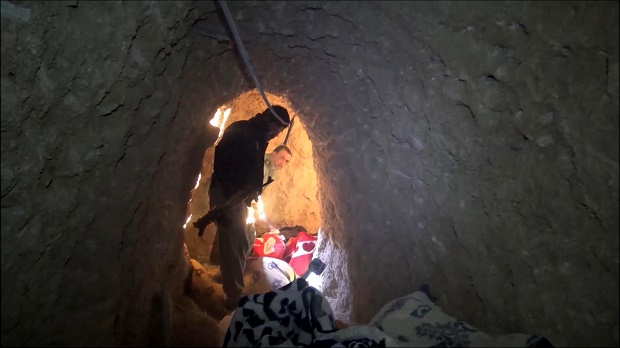
In this image made from video taken on Sunday, Nov. 22, 2015, Kurdish security forces are seen in a tunnel complex under the city of Sinjar, northern Iraq that were used by Islamic State fighters to move undetected and avoid coalition airstrikes before the town was retaken from the militants. AP
IRBIL, Iraq — Under the Iraqi town of Sinjar, Islamic State group militants built a network of tunnels, complete with sleeping quarters, wired with electricity and fortified with sandbags. There, they had boxes of U.S.-made ammunition, medicines and copies of the Quran stashed on shelves.
The Associated Press obtained extensive video footage of the tunnels, which were uncovered by Kurdish forces that took the city in northwestern Iraq earlier this month after more than a year of IS rule.
“We found between 30 and 40 tunnels inside Sinjar,” said Shamo Eado, a commander from Sinjar from the Iraqi Kurdish fighters known as peshmerga. “It was like a network inside the city.”
“Daesh dug these trenches in order to hide from airstrikes and have free movement underground as well as to store weapons and explosives,” Eado said using an Arabic acronym for the Islamic State group. “This was their military arsenal.”
The video, shot by a freelancer touring the town with Kurdish fighters, showed two tunnels running several hundred meters (yards), each starting and ending from houses, through holes knocked in walls or floors.
The narrow tunnels, carved in the rock apparently with jackhammers or other handheld equipment, are just tall enough for a man to stand in. Rows of sandbags line sections of the walls, electrical wires power fans and lights and metal braces reinforce the ceilings. One section of the tunnel resembled a bunker. Dusty copies of the Quran sit above piles of blankets and pillows. Prescription drugs — painkillers and antibiotics — lie scattered along the floor.
In another section of the tunnel, the footage shows stocks of ammunition, including American-made cartridges and bomb-making tools.
ISIS has been digging tunnels for protection and movement throughout the territory it controls in Iraq and Syria, even before the U.S.-led coalition launched its campaign of airstrikes against the group more than a year ago.
“This has been part of ISIS’ strategy from the very beginning,” said Lina Khatib a senior research associate at the Arab Reform initiative, a Paris-based think-tank. “ISIS has been well prepared for this kind of intervention.”
The Islamic State group took control of Sinjar in August 2014, killing and capturing thousands of the town’s mostly Yazidi residents. Yazidis, a religious minority in Iraq with roots that date back to ancient Mesopotamia, are considered heretics by the hard-line Islamic State group.
Hundreds of women are thought to still be in ISIS captivity, those who have escaped say many Yazidi women are forced to convert to Islam and marry ISIS fighters.
After pushing ISIS out of Sinjar, peshmerga officials and local residents have uncovered two mass graves in the area. One, not far from the city center is estimated to hold 78 elderly women’s bodies. The second grave uncovered about 9 miles (15 kilometers) west of Sinjar contained between 50 and 60 bodies of men, women and children.
Eado, the peshmerga commander, said that as Kurdish forces clear Sinjar of explosives, he expects to find more tunnels and evidence of atrocities.
“It’s just a matter of time,” he said.